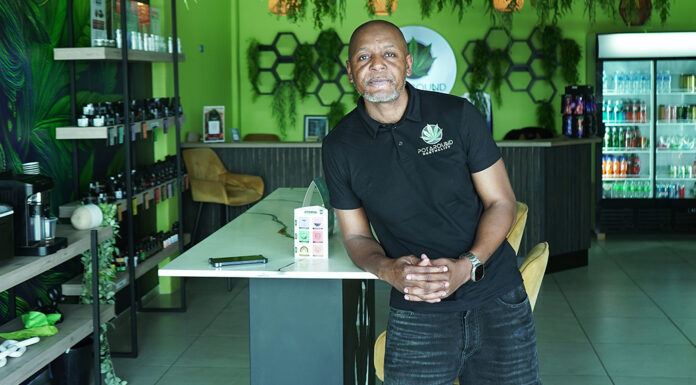Once condemned and criminalized, cannabis is now being celebrated across industries, from skincare and art to high-end lounges and fashion.
But for entrepreneur Tshepo Mokoena, founder of Northcliff Potaround, Johannesburg’s sophisticated cannabis boutique and social space, the plant’s resurgence represents more than a lifestyle trend. It is, he says, a story of redemption and recognition.
“I remember the stigma,” Mokoena recalls. “People associated cannabis with crime or laziness, not wellness or entrepreneurship. In South Africa, that judgment ran deep; it wasn’t just social, it was moral and legal. Yet, even then, there were people who quietly understood its potential.”
Mokoena believes cannabis became a moral battleground because it symbolized freedom in a world resistant to change.
“Cannabis represented freedom of thought, lifestyle, and even healing, and that made conservative societies uncomfortable. It was easier to criminalize something than to try to understand it,” he says.
His decision to embrace a substance that society once labelled “dirty” was rooted in curiosity rather than defiance.
“Progress often begins with uncomfortable conversations,” he reflects. “Embracing cannabis wasn’t rebellion; it was recognition of potential.”
The transformation of cannabis from taboo to trend has been gradual but inevitable.
“It happened through information, exposure, and time,” says Mokoena. “As science caught up with culture and people began sharing personal experiences, the narrative started to shift, and then capital followed, as it always does. Science gave it legitimacy, culture gave it voice, capitalism gave it visibility, and time gave people permission to change their minds.”
In recent years, media and celebrity culture have played a defining role in reshaping cannabis’ image. “Media turned cannabis from taboo to trend. Celebrities normalized it – they made it aspirational. That visibility softened resistance and reframed it as part of a modern, wellness-driven lifestyle.”
The plant’s influence now stretches far beyond traditional use, appearing in art, fashion, skincare and even fragrance. “It shows how society has learnt to turn culture into commerce. Cannabis has become a symbol of openness, experimentation, and branding.”
According to Mokoena, the “new face” of cannabis is no longer the stereotype of the idle or rebellious user. “The new face is the entrepreneur, the innovator, and the responsible consumer, people who see cannabis not as escape, but as opportunity,” he says.
That mindset shapes the philosophy behind Northcliff Potaround, a space that merges sophistication with social consciousness. “The goal isn’t just to sell cannabis; it’s to elevate it responsibly,” he explains. “Authenticity matters. Integrity, quality and education are key.”
For Mokoena, seeing cannabis treated with respect feels like poetic justice. “Something once demonized is now celebrated – it reminds me that perception is power,” he says.
“But full respect will only come when those who were punished or marginalized under the old system are included in the new economy. Legalisation shouldn’t only benefit those who can afford to invest.”
Mokoena envisions a future where South Africa becomes a leader in cannabis innovation and sustainability. “We have the climate, the culture, and the creativity. What we need now are policies that support inclusivity, rural farmers, and small-scale entrepreneurs.”
And if there is one misconception, he wishes society would finally let go of, it is the notion that cannabis users lack ambition or discipline.
“Some of the most creative and driven people I know have built businesses and ideas around a plant once written off as a vice,” As he reflects on his own journey, Mokoena pauses and smiles. “What they called rebellion, was really healing.”



